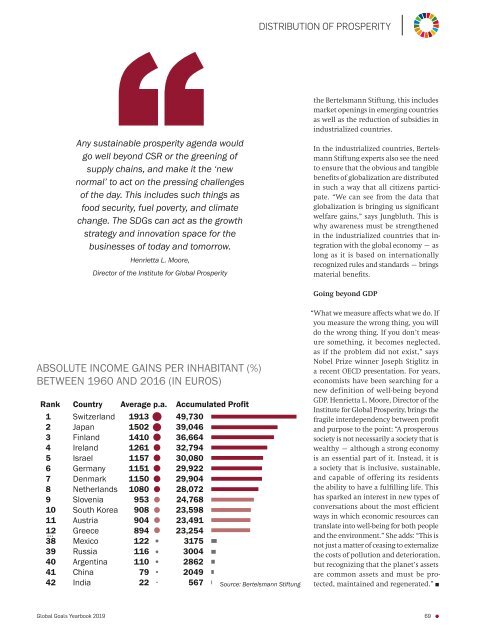Aliging Profit with Purpose - Global Goals Yearbook 2019
What are companies for? The rules for companies have changed. The focus is increasingly on their sustainable, social, and ecological impacts. The strategic orientation toward the so-called corporate purpose is decisive for profitable growth in the future. This currently results in a large number of questions for businesses: How do you find an inspiring and future-oriented corporate purpose, and how can it be aligned in such a way that it brings profitable growth and social responsibility in concert? The new 2019 edition of the Global Goals Yearbook offers answers to these crucial questions thanks to its consistent orientation toward the UN Sustainable Development Goals and a competent editorial board and author pool.
What are companies for? The rules for companies have changed. The focus is increasingly on their sustainable, social, and ecological impacts. The strategic orientation toward the so-called corporate purpose is decisive for profitable growth in the future.
This currently results in a large number of questions for businesses: How do you find an inspiring and future-oriented corporate purpose, and how can it be aligned in such a way that it brings profitable growth and social responsibility in concert? The new 2019 edition of the Global Goals Yearbook offers answers to these crucial questions thanks to its consistent orientation toward the UN Sustainable Development Goals and a competent editorial board and author pool.
Create successful ePaper yourself
Turn your PDF publications into a flip-book with our unique Google optimized e-Paper software.
DISTRIBUTION OF PROSPERITY<br />
“<br />
Any sustainable prosperity agenda would<br />
go well beyond CSR or the greening of<br />
supply chains, and make it the ‘new<br />
normal’ to act on the pressing challenges<br />
of the day. This includes such things as<br />
food security, fuel poverty, and climate<br />
change. The SDGs can act as the growth<br />
strategy and innovation space for the<br />
businesses of today and tomorrow.<br />
Henrietta L. Moore,<br />
Director of the Institute for <strong>Global</strong> Prosperity<br />
the Bertelsmann Stiftung, this includes<br />
market openings in emerging countries<br />
as well as the reduction of subsidies in<br />
industrialized countries.<br />
In the industrialized countries, Bertelsmann<br />
Stiftung experts also see the need<br />
to ensure that the obvious and tangible<br />
benefits of globalization are distributed<br />
in such a way that all citizens participate.<br />
“We can see from the data that<br />
globalization is bringing us significant<br />
welfare gains,” says Jungbluth. This is<br />
why awareness must be strengthened<br />
in the industrialized countries that integration<br />
<strong>with</strong> the global economy – as<br />
long as it is based on internationally<br />
recognized rules and standards – brings<br />
material benefits.<br />
Going beyond GDP<br />
ABSOLUTE INCOME GAINS PER INHABITANT (%)<br />
BETWEEN 1960 AND 2016 (IN EUROS)<br />
Rank Country Average p.a. Accumulated <strong>Profit</strong><br />
1 Switzerland 1913 49,730<br />
2 Japan 1502 39,046<br />
3 Finland 1410 36,664<br />
4 Ireland 1261 32,794<br />
5 Israel 1157 30,080<br />
6 Germany 1151 29,922<br />
7 Denmark 1150 29,904<br />
8 Netherlands 1080 28,072<br />
9 Slovenia 953 24,768<br />
10 South Korea 908 23,598<br />
11 Austria 904 23,491<br />
12 ... Greece 894 23,254<br />
38 Mexico 122 3175<br />
39 Russia 116 3004<br />
40 Argentina 110 2862<br />
41 China 79 2049<br />
42 India 22 567<br />
Source: Bertelsmann Stiftung<br />
“What we measure affects what we do. If<br />
you measure the wrong thing, you will<br />
do the wrong thing. If you don’t measure<br />
something, it becomes neglected,<br />
as if the problem did not exist,” says<br />
Nobel Prize winner Joseph Stiglitz in<br />
a recent OECD presentation. For years,<br />
economists have been searching for a<br />
new definition of well-being beyond<br />
GDP. Henrietta L. Moore, Director of the<br />
Institute for <strong>Global</strong> Prosperity, brings the<br />
fragile interdependency between profit<br />
and purpose to the point: “A prosperous<br />
society is not necessarily a society that is<br />
wealthy – although a strong economy<br />
is an essential part of it. Instead, it is<br />
a society that is inclusive, sustainable,<br />
and capable of offering its residents<br />
the ability to have a fulfilling life. This<br />
has sparked an interest in new types of<br />
conversations about the most efficient<br />
ways in which economic resources can<br />
translate into well-being for both people<br />
and the environment.” She adds: “This is<br />
not just a matter of ceasing to externalize<br />
the costs of pollution and deterioration,<br />
but recognizing that the planet’s assets<br />
are common assets and must be protected,<br />
maintained and regenerated.”<br />
<strong>Global</strong> <strong>Goals</strong> <strong>Yearbook</strong> <strong>2019</strong><br />
69

















